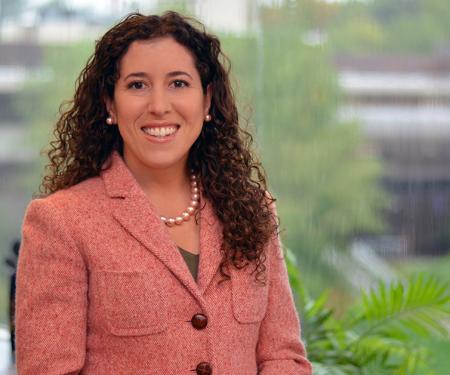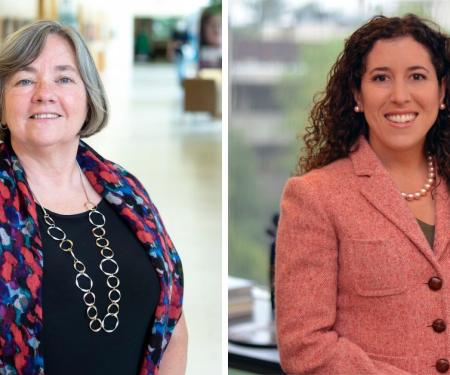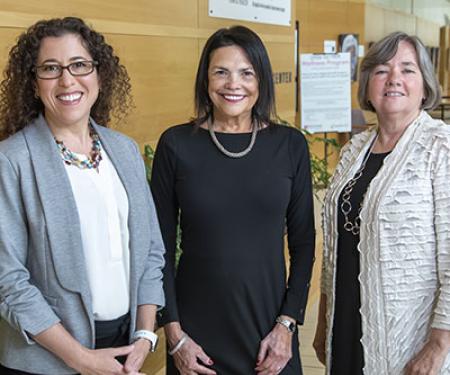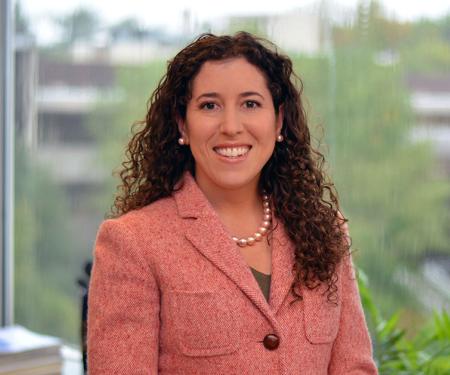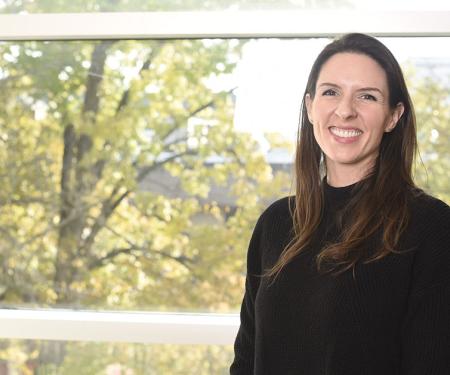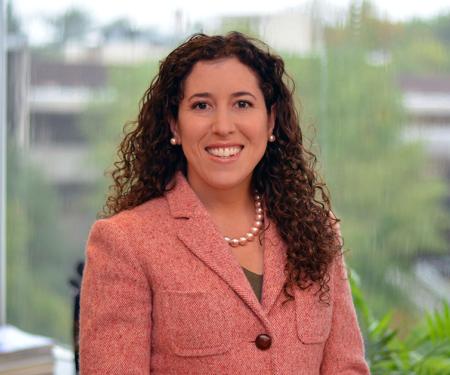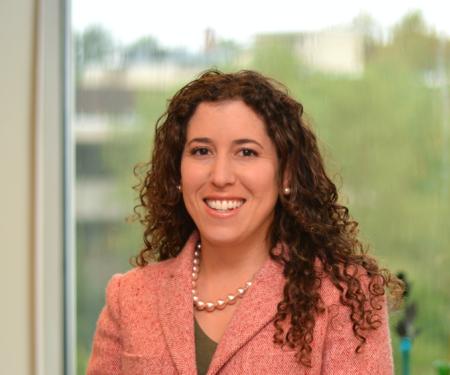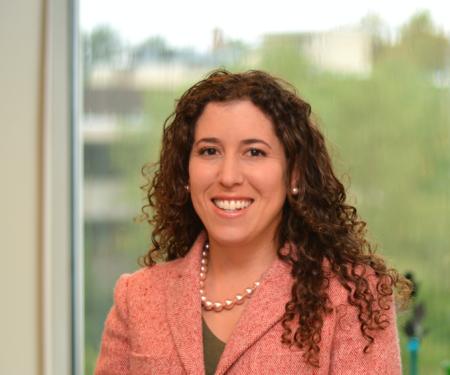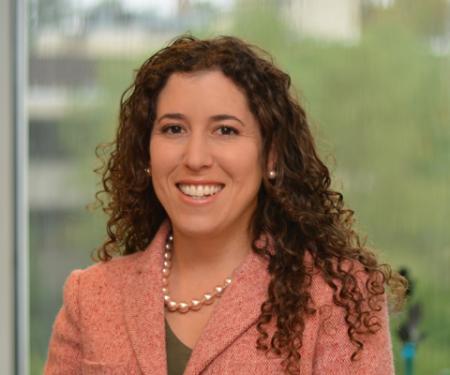This Fox Chase professor participates in the Undergraduate Summer Research Fellowship.
Learn more about Research Volunteering.
Related Articles
00 / 00

This Fox Chase professor participates in the Undergraduate Summer Research Fellowship.
Learn more about Research Volunteering.
Associate Professor, Cancer Prevention and Control Program
Survivorship, QOL, Sexual Function, Breast Cancer, Interventions


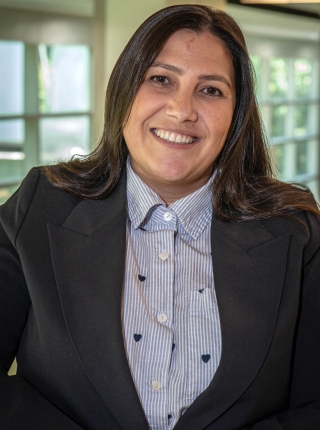


Work in our lab centers on developing evidence-based interventions that aim to improve sexual health outcomes, relationships, and quality of life for those affected by cancer. We incorporate a diverse range of study designs and methods, including qualitative methodology, survey methods, communication analysis, and randomized controlled trials, which yield a deep understanding of the problems under investigation and thus help us develop feasible, acceptable, and effective interventions. Our research studies are funded by the National Cancer Institute and American Cancer Society.
Work in our lab investigates the factors contributing to cancer survivors’ psychosocial well-being and ability to cope with after-effects of cancer, with a focus on cancer-related sexual concerns. Research in our lab has demonstrated that impairments in sexual quality of life are common, distressing, and often persist if unaddressed. Findings have also illuminated the key role that cancer survivors’ intimate relationships play in survivors’ psychosocial well-being. Collectively, work in this area has contributed to the understanding of the prevalence and nature of sexual concerns for those diagnosed and treated for cancer, thus helping to pave the way feasible, acceptable, and potentially effective interventions.
In addressing the many issues that confront cancer survivors, interpersonal relationships play a critical role, and our lab has interest in developing and evaluating couple-based interventions for cancer-related health concerns, foremost of which are sexuality and intimacy. A key objective of this work is to identify how best to help couples cope. In earlier work, we elucidated a model of coping flexibly with sexual concerns in cancer that influenced subsequent intervention development. We have found promising effects of couple-based approaches for addressing sexual concerns and enhancing intimacy and related outcomes in breast and colorectal cancer, and are currently evaluating this approach in a clinical trial. We are also extending this line of research to women with metastatic breast cancer, about whom little is known with respect to their sexual and intimacy needs and who are in particular need of survivorship-related interventions. We plan to continue this work by determining optimal methods for dissemination of these approaches, once determined effective, and by assessing the utility of couple-based approaches in enhancing other outcomes in cancer populations in future studies.
An additional major area of interest in our lab is to investigate patient-provider communication about sexual health after cancer, with the ultimate aim of integrating sexual health within cancer care. Our work in this area has been instrumental in characterizing the prevalence and nature of patient-provider communication about sexual health in cancer, elucidating patient and provider barriers and facilitators of this communication, and identifying potential paths forward to improve clinical care for sexual concerns. This work is culminating in innovative provider-focused and patient-focused interventions which hold promise for integrating sexual health into cancer care and enhancing patients’ psychosocial outcomes.
Arring, N., Barton, D., Reese, J.B. (2023). Clinical Practice Strategies to Address Sexual Health in Female Cancer Survivors. Journal of Clinical Oncology, 41, 4927-4936.
Reese, J.B., Bober, S.L., Sorice, K.A., Handorf, E., Chu, C.S., Middleton, D., McIlhenny, S., & El-Jawahri, A. (2023). Starting the Conversation: Randomized Pilot Trial of an Intervention to Promote Effective Clinical Communication about Sexual Health for Gynecologic Cancer Survivors. Journal of Cancer Survivorship. ePub ahead of print, doi: 10.1007/s11764-022-01327-4.
Yankey, H.N., Lopez , M.D., Devarajan, K., Gleason, R., Pirlamarla, A.K., Dougherty, T., Dotan, E., Farma, J.M., Vijayvergia, N.E., Reese, J.B., Meyer, J.E. (2023). Prevalence and Predictors of Sexual Dysfunction (SD) after Treatment of Localized Rectal and Anal Cancer (LRAC). International Journal of Radiation, Biology & Physics, 117 (2), Suppl 1, e353.
Benedict, C., Shaffer, K.M., Wirtz, M.R., Ford, J., Reese, J.B. (2022). Current Considerations in Interventions to Address Sexual Function and Improve Care for Women with Cancer. Current Sexual Health Reports, 14, 222–230.
Arthur, E.K., Menon, U., Reese, J.B., Browning, K., Overcash, J., Rose, K., & Wills, C.E. (2022). Profiles of Women’s Adjustment after Cancer Based on Sexual and Psychosocial Wellbeing: Results of a Cluster Analysis. BMC Cancer, 22.
Gorman, J.R., Lyons, K.S., Harvey, S.M., Acquati, C., Salsman, J.M., Kashy, D.A., Drizin, J.H., Smith, E., Flexner, L.M., Hayes-Lattin, B., & Reese, J.B. (2022). Opening the Conversation: study protocol for a Phase III trial to evaluate a couple-based intervention to reduce reproductive and sexual distress among young adult breast and gynecologic cancer survivor couples. Trials, 23, 730. doi: 10.1186/s13063-022-06665-3.
Reese, J.B., El-Jawahri, A., Sorice, K., Cruz, C., Bober, S.L., Daly, M.B., Zimmaro, L.A., Beach, M.C., Wittenberg, E., Wolff, A.C., Handorf, E. & Lepore, S.J. (2022). Investigating the Impact of the COVID-19 Pandemic on Breast Cancer Clinicians’ Communication about Sexual Health. Supportive Care in Cancer, 30, 5801-5810.
Reese, J.B., Zimmaro, L.A., McIlhenny, S., Sorice, K., Porter, L.S., Zaleta, A.K., Daly, M.B., Cribb, B., & Gorman, J.R. (2022). Coping with Changes to Sex and Intimacy After a Diagnosis of Metastatic Breast Cancer: Results from a Qualitative Investigation with Patients and Partners. Frontiers in Psychology, 13, 864893. doi: 10.3389/fpsyg.2022.864893.
Shaffer, K.M., Kennedy, E., Glazer, J.V., Clayton, A.H., Cohn, W., Reese, J.B., Millard, T.A., Ritterband, L.M., & Showalter, S. (2022). Including Partners in Discussions of Sexual Side Effects from Breast Cancer: A Qualitative Study of Survivors, Partners, and Providers. Supportive Care in Cancer, 30, 4935-4944.
Zimmaro, L.A., Sorice, K., Handorf, E., Daly, M., & Reese, J.B. (2022). Understanding clinical communication about mood in breast cancer patients: A mixed methods analysis. Patient Education and Counseling, 105, 2089-2095.
Gorman, J.R., Lyons, K., Reese, J.B., Acquati, C., Smith, Drizin, J., Salsman, Hayes-Lattin, Harvey. (2022). Adapting a Theory-Informed Intervention to Help Young Adult Couples Cope with Reproductive and Sexual Concerns after Cancer. Frontiers in Psychology, 13, 813548.
Acquati, C., Hendren, S., Wittman, D., Reese, J.B., Karam, E., Duby, A., Dunn, K.B., & Kayser, K. (2022). Psychological Distress, Sexual Functioning, and Relationship Satisfaction among Rectal Cancer Patients and Their Partners During and After Treatment. Psycho-Oncology. Online ahead of print. doi: 10.1002/pon.5880
Zimmaro, L.A., Moss, A., Reibel, D.K., Handorf, E.A., Reese, J.B., & Fang, C. Y. (2021). A Telephone-Adapted Mindfulness-Based Stress Reduction Program: Preliminary Effects among Healthcare Employees. Behavioral Science, 11, 39. https://doi.org/10.3390/bs11100139
Reese, J.B., Zimmaro, L.A., Bober, S.L., Sorice, K., Handorf, E., Wittenberg, E., El-Jawahri, A., Beach, M.C., Wolff, A.C., Daly, M.B., Izquierdo, B., & Lepore, S.J. Mobile Technology-based (mLearning) Intervention to Enhance Breast Cancer Clinicians’ Communication about Sexual Health: A Pilot Trial. (2021). JNCCN, doi: 10.6004/jnccn.2021.7032
Reese, J.B., Sorice, K., Pollard, W., Handorf, E., Beach, M.C., Daly, M.B., Porter, L.S., Tulsky, J.A., & Lepore, S.J. (2021). Efficacy of a Multimedia Intervention in Enhancing Breast Cancer Patients’ Clinical Communication about Sexual Health: Results of a Randomized Controlled Trial. Psycho-Oncology, 30, 681-690.
Zimmaro, L.A., Deng, M., Handorf, E., Fang, C. Denlinger, C., & Reese, J.B. (2021). Understanding benefit finding among patients with colorectal cancer: A longitudinal study. Supportive Care in Cancer, 29, 2355-2362.
The Cancer Prevention and Control Program at Fox Chase Cancer Center is seeking highly motivated candidates for an on-site post-doctoral research fellow position in psycho-oncology and cancer survivorship research in the lab of behavioral scientist and licensed psychologist Dr. Jennifer Reese. The ideal candidate has research interests in cancer survivorship and/or dyadic research in the context of cancer, although work in other medical contexts will also be considered. Opportunities are available to work on innovative NCI-funded and other funded studies evaluating behavioral interventions to improve the care and health outcomes of cancer survivors in relation to sexual and reproductive health and improve overall well-being. Additional opportunities are available to analyze datasets from couples’ intervention trials in oncology, patient-provider communication and dyadic communication data, cohort studies, and others. Research tasks include literature searches, data collection and management, quantitative and qualitative data analysis, presentation of data, and manuscript and grant review and preparation. The Reese lab provides strong training, with particular emphasis on helping fellows gain skills for writing competitive grant applications; the PI has a strong track record of supporting junior faculty to receive K awards.
Candidates with superior conceptual, organizational, and analytical skills are sought; those with track records of research productivity, including published scientific manuscripts, and who can demonstrate initiative in conducting research will receive priority. Experience in qualitative methods is helpful but not required. Qualifications for this position include a doctoral degree in Psychology from an APA-accredited program although those who have a doctoral degree in related fields (e.g., PhD in Public Health) will be considered. A background in health psychology or behavioral medicine is also preferred. For Clinical Psychology PhD candidates, an accredited clinical internship is required, and for all candidates, dissertation must be successfully defended prior to start date. Clinical supervision to facilitate psychology licensure will be provided for fellows with Clinical Psychology PhD seeking licensure. This is anticipated to be a two-year position, with the potential for extension.
As one of the four original cancer centers to receive comprehensive designation from the National Cancer Institute, Fox Chase Cancer Center has been at the forefront of cancer research for almost 90 years. We are home to excellent research facilities, top clinicians and scientists, and outstanding patient care. Our singular focus on cancer, which couples discovery science with state of the art clinical care and population health, remains the foundation of our work.
The scientist training programs at Fox Chase Cancer Center provide professional development opportunities in four core areas identified as crucial for successful careers in science, research, and health care including communication, leadership, teaching, and mentorship. Upon joining the program, graduate students and postdocs develop individual development plans to help guide their growth. Training throughout the year is supplemented with free professional development opportunities, including a robust ‘How To’ series, writing courses, networking, mentorship, and teaching opportunities, a trainee-led seminar series, a trainee-led annual Research Conference, and more. Postdocs at Fox Chase Cancer Center are supported by the Temple University Postdoc Association and the Office of Academic Affairs at Fox Chase, and are compensated with competitive pay and benefits.
This position will reside within the Cancer Prevention and Control Program (CPC) at Fox Chase. As one of three core research programs at Fox Chase, the CPC maintains a multidisciplinary, collaborative program that integrates basic and applied research in the areas of chemoprevention, medical science, and the behavioral, social, and population sciences. The objective of the CPC is to address the needs of individuals across the entire continuum of cancer, from risk to survivorship. The CPC is housed in an expansive building that includes research offices and clinical facilities within the main Fox Chase campus. There is frequent interaction among clinical and population scientists, which fosters a rich environment for successfully conducting interdisciplinary research projects. The CPC holds monthly scholarly meetings in which faculty members present new and ongoing work and forge collaborations, as well as opportunities to have CPC faculty experts review and provide feedback on in-progress grant applications through a Works in Progress series. The Works in Progress series has led to the submission of highly competitive and successful applications to NCI and other funding organizations on a range of grant mechanisms including career development awards and is open to post-doctoral fellows and faculty members in CPC.
In addition to the robust training program, scientists at Fox Chase Cancer Center benefit from being part of the rich scientific and biomedical environment in the Philadelphia region. Opportunities for cross-institution collaboration often arise and are encouraged.
Candidates should submit a cover letter, curriculum vitae, scholarly writing sample, and three references with contact information (name, title/affiliation, phone, email) to Dr. Jennifer Reese via email at [email protected]. At least one and preferably two of the referees should be knowledgeable about the candidate’s research skills and productivity. Qualified candidates will then be invited to complete a job application. Review of applications will continue until the position is filled. Salary is commensurate with qualifications and experience and will be in line with NIH postdoctoral fellow salaries; benefits will be provided.
This Fox Chase professor participates in the Undergraduate Summer Research Fellowship.
Learn more about Research Volunteering.
